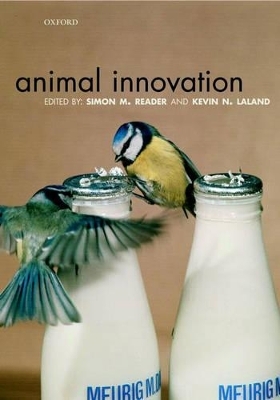
Animal Innovation
Oxford University Press (Verlag)
978-0-19-852622-3 (ISBN)
In 1953 a young female Japanese macaque called Imo began washing sweet potatoes before eating them, presumably to remove dirt and sand grains. Soon other monkeys had adopted this behaviour, and potato washing gradually spread throughout the troop. When, three years after her first invention, Imo devised a second novel foraging behaviour, that of separating wheat from sand by throwing mixed handfuls into water and scooping out the floating grains, she was almost instantly heralded around the world as a 'monkey genius'. Imo is probably the most celebrated of animal innovators. In fact, many animals will invent new behaviour patterns, adjust established behaviours to a novel context, or respond to stresses in an appropriate and novel manner.
Innovation is an important component of behavioural flexibility, vital to the survival of individuals in species with generalist or opportunistic lifestyles, and potentially of critical importance to those endangered or threatened species forced to adjust to changed or impoverished environments. Innovation may also have played a central role in avian and primate brain evolution. Yet until recently animal innovation has been subject to almost complete neglect by behavioural biologists, psychologists, social learning researchers, and conservation-minded biologists.
This collection of stimulating and readable articles by leading scientific authorities is the first ever book on 'animal innovation', designed to put the topic of animal innovation on the map and heighten awareness of this developing field.
PART I - DEFINITIONS AND KEY QUESTIONS ; 1. Animal innovation: an introduction ; PART II - COMPARATIVE AND EVOLUTIONARY ANALYSES OF INNOVATION ; 2. Positive and negative correlates of feeding innovations in birds: evidence for limited modularity ; 3. Behavioural innovation: a neglected issue in the ecological and evolutionary literature? ; 4. Environmental variability and primate behavioural flexibility ; 5. Is innovation in bird song adaptive? ; 6. Social Learning: promoter or inhibitor of innovation? ; PART III - PATTERNS AND CAUSES OF ANIMAL INNOVATION ; 7. Experimental studies of innovation in the guppy ; 8. The role of neophobia and neophilia in the development of innovative behaviour of birds ; 9. Characteristics and propensities of marmosets and tamarins: Implications for studies of innovation ; PART IV - INNOVATION, INTELLIGENCE, AND COGNITION ; 10. Conditions of innovative behaviour in primates ; 11. Novelty in deceit ; 12. Innovation as a behavioural response to environmental challenges: a cost and benefit approach ; 13. Innovation and creativity in forest-living rehabilitant orangutans ; PART V - HUMAN INNOVATION ; 14. Human innovation: two Darwinian analyses ; PART VI - DISCUSSION ; 16. To innovate or not to innovate? That is the question
| Erscheint lt. Verlag | 1.10.2003 |
|---|---|
| Zusatzinfo | numerous figures and halftones |
| Verlagsort | Oxford |
| Sprache | englisch |
| Maße | 168 x 240 mm |
| Gewicht | 606 g |
| Themenwelt | Geisteswissenschaften ► Psychologie ► Test in der Psychologie |
| Naturwissenschaften ► Biologie ► Zoologie | |
| ISBN-10 | 0-19-852622-9 / 0198526229 |
| ISBN-13 | 978-0-19-852622-3 / 9780198526223 |
| Zustand | Neuware |
| Haben Sie eine Frage zum Produkt? |
aus dem Bereich


